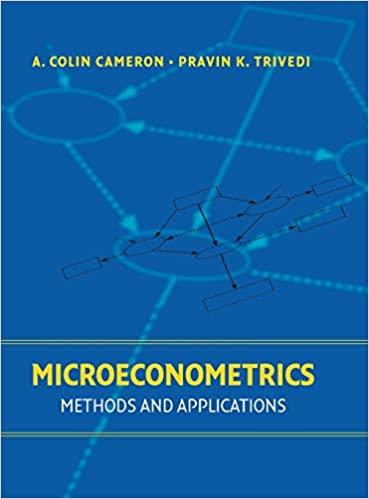Consider the regression model (mathbf{y}=beta_{1} mathbf{x}+mathbf{Z} boldsymbol{beta}_{2}+mathbf{u}), where (y) is an (N times 1) vector, (mathbf{Z}) is
Question:
Consider the regression model \(\mathbf{y}=\beta_{1} \mathbf{x}+\mathbf{Z} \boldsymbol{\beta}_{2}+\mathbf{u}\), where \(y\) is an \(N \times 1\) vector, \(\mathbf{Z}\) is an \(N \times K\) matrix, and \(\mathbf{x}\) is an \(N \times 1\) vector of a scalar regressor, some of whose elements are missing. Assume that observations are missing at random and \(E[\mathbf{u} \mid \mathbf{x}, \mathbf{Z}]=\mathbf{0}\) and \(\mathrm{E}[\mathbf{u u} \mid \mathbf{x}, \mathbf{Z}]=\sigma^{2} \mathbf{I}_{N}\). Both \(\mathbf{y}\) and \(\mathbf{Z}\) are fully observed. The following approach is proposed to deal with the missing data. Assume a linear regression model relating \(\mathbf{x}\) to \(\mathbf{Z}, \mathbf{x}=\mathbf{Z} \gamma+\varepsilon\), where \(\mathrm{E}[\varepsilon \mid \mathbf{Z}]=\mathbf{0}\) and \(E\left[\varepsilon \varepsilon^{\prime} \mid \mathbf{Z}\right]=\sigma_{\varepsilon}^{2} \mathbf{I}_{N}\). Then let \(\widehat{\gamma}=\left[\mathbf{Z}_{c}^{\prime} \mathbf{Z}_{c}\right]^{-1} \mathbf{Z}_{c}^{\prime} \mathbf{x}_{c}\), where the subscript \(c\) refers to "complete data." Impute values of \(\widehat{\mathbf{x}}_{\mathrm{m}}=\mathbf{Z}_{\mathrm{m}}\left[\mathbf{Z}_{\mathrm{c}}^{\prime} \mathbf{Z}_{\mathrm{c}}\right]^{-1} \mathbf{Z}_{\mathrm{c}}^{\prime} \mathbf{x}_{c}\), where \(\mathbf{x}_{\mathrm{m}}\) refers to the missing observations and \(\mathbf{Z}_{\mathrm{m}}\) to the corresponding values of \(\mathbf{Z}\). The original regression is then reestimated using the full set of \(N\) observations after replacing the missing values of \(\mathbf{x}\) by imputed values.
(a) Explain why the OLS regression estimator based on complete and imputed observations might be biased in finite samples.
(b) What additional assumptions are required to prove that the OLS estimator based on complete plus imputed values is consistent?
(c) Is the OLS estimator efficient?
Step by Step Answer:

Microeconometrics Methods And Applications
ISBN: 9780521848053
1st Edition
Authors: A.Colin Cameron, Pravin K. Trivedi





